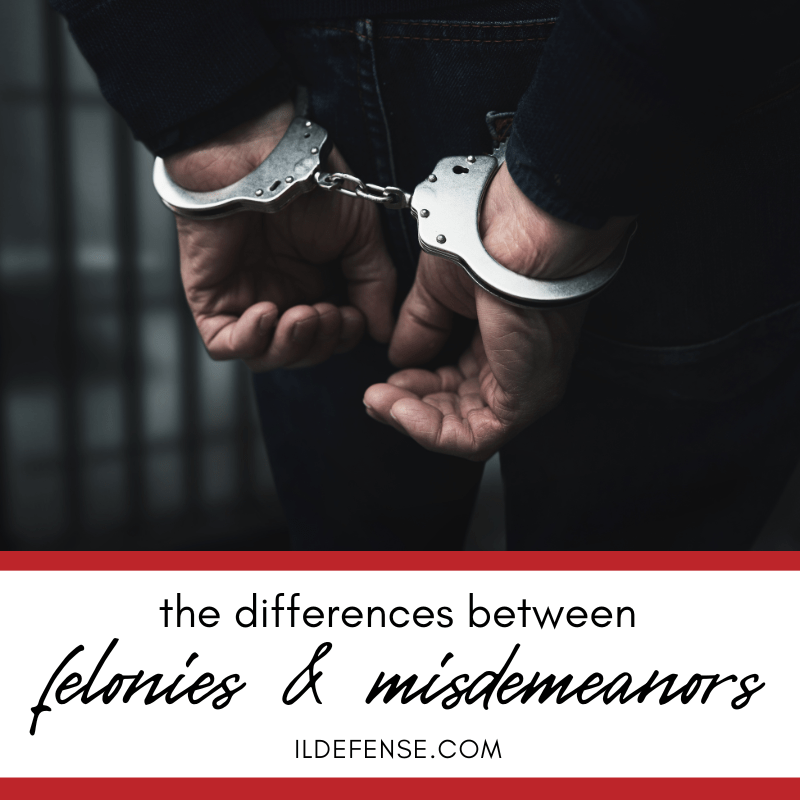
Understanding the differences between misdemeanors and felonies in Illinois is essential if you face criminal charges. Knowing how these two types of crimes differ can help you better navigate the legal system and understand the potential consequences of your actions.
Differences Between Misdemeanors and Felonies in Illinois
When dealing with criminal charges, it’s crucial to understand the distinctions between misdemeanors and felonies. This guide explains the following:
- The definition of misdemeanors and felonies
- Types of misdemeanors and felonies
- Legal consequences for each
- How a lawyer can help
- Frequently asked questions
Here’s a closer look at each.
The Definition of Misdemeanors and Felonies
A misdemeanor is a lesser criminal act typically punishable by less than a year in jail, fines, or community service. In contrast, a felony is a more serious crime that can result in more than a year of imprisonment, larger fines, and a more significant impact on your future.
Related: Illinois criminal defense information
Types of Misdemeanors and Felonies
Misdemeanors in Illinois are classified into three categories: Class A, Class B, and Class C. Class A misdemeanors are the most serious, including offenses like DUI and theft under $500. Class B and C misdemeanors include less severe offenses like minor drug possession and disorderly conduct.
Felonies are categorized from Class X (the most serious) to Class 4 (the least serious). Class X felonies include crimes like armed robbery and aggravated sexual assault, while Class 4 felonies include offenses like forgery and certain drug crimes.
Related: What to do if you’re charged with drug possession in Chicago
Legal Consequences for Each
Misdemeanors may result in up to 364 days in jail, fines up to $2,500, and other penalties such as probation or community service. Felonies, however, carry much harsher penalties. Class X felonies can lead to 6 to 30 years in prison, while a Class 4 felony can result in 1 to 3 years of imprisonment.
How a Lawyer Can Help
Having a lawyer can be beneficial when facing criminal charges. A lawyer with experience in criminal defense can help you understand the charges, navigate the legal system, and develop a defense strategy tailored to your case. While no lawyer can guarantee a specific outcome, their guidance can make a significant difference in your situation.
Related: DUI charges in Illinois
FAQ About Differences Between Misdemeanors and Felonies in Illinois
Check out these commonly asked questions about the differences between misdemeanors and felonies in Illinois. If you don’t see your question here, please call our office and we’ll find you the answers you need.
What is the main difference between a misdemeanor and a felony?
The main difference is the severity of the crime and the corresponding punishment. Misdemeanors are less severe and carry lighter penalties, while felonies are more serious and can result in longer imprisonment and larger fines.
Can a misdemeanor be elevated to a felony?
Yes, certain circumstances can elevate a misdemeanor to a felony. For example, repeat offenses or the presence of aggravating factors can lead to more severe charges.
Related: What happens if you drive on a suspended license in Chicago?
How long does a misdemeanor stay on your record in Illinois?
A misdemeanor can stay on your record indefinitely unless you take steps to have it expunged or sealed. Expungement or sealing can help you move forward without the burden of a criminal record.
What should I do if I’m charged with a felony?
If you are charged with a felony, it’s crucial to contact a criminal defense lawyer immediately. They can guide you through the legal process, help protect your rights, and work towards the best possible outcome for your case.
How can a lawyer help with misdemeanor charges?
A lawyer can help by providing legal advice, negotiating plea deals, and representing you in court. Their assistance can reduce the potential penalties and help you understand your options.
Do You Need to Talk to an Attorney?
If you’ve been accused of a crime, we may be able to help you – and don’t worry: It’s completely confidential. Call us at 847-920-4540 or fill out the form below to schedule your free, private consultation with an experienced and skilled Chicago criminal defense attorney now.
Contact Us
"*" indicates required fields








